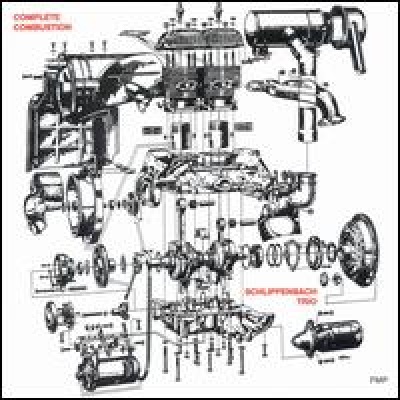
Complete Combustion
by Thom JurekThe trio of Alexander von Schlippenbach (piano), Evan Parker (soprano and tenor saxophones), and Paul Lovens (cymbals and drums) has been in existence in one form or another since the early '70s. This set was recorded live in 1998 during the Workshop for Free Musik in Germany. The liner notes by Markus Muller are full of the usual "we Europeans are the real free music masters" comments that truly equal a kind of cultural fascism (something you would think the Germans would be acutely aware of). This transatlantic competition -- begun in part at least by no less a figure than Evan Parker in the 1960s -- sometimes makes for interesting music, but more often than not leads to two groups of people competing for the same dubious crown of who can distance themselves the most from the gorgeous gift that is jazz. Actually, no one should care who makes it, as long as the music, free or not free, improvised or charted, is made with passion, soul, and a willingness to test limits without trying to pull one over on an audience. Frankly, that is the case here: three men who have played together for the better part of 30 years digging deep within themselves and each other and creating a wide open music where rhythms and counterpoint clash, chromatics and modal strategies collapse into one another, and all previously held notions of harmonic assonance are stabbed through and through with a violent yet sublime atonalism that cries out to the heavens with joy. Parker and von Schlippenbach are telepathic in their interaction on "Complete Combustion," but it is truly Lovens who the piece belongs to: It is he who challenges von Schlippenbach to hold true to the axiomatic notion of the piano as a rhythm instrument. His height-scaling cymbal work and triple rim shot accents into von Schlippenbach's huge chords create the body of the piece. Parker is an accompanist here, and seems content to accent the color and shape of the communication between pianist and drummer. On "Fuels 1-7," however, it is Parker and von Schlippenbach who weave tapestries of broken lines and collages of chords and broken harmonic equations. This pair is so quick to hear and respond it is literally impossible to tell who initiated what. Lovens is in the heart, as the transposer of both sets of ideas, keeping the flow from melting into a dissonance so pure it all becomes sound -- which seems to be what Parker and von Schlippenbach seek. This extension of the will by Lovens creates a taught wire of tension that finally explodes into something that we can only call "incongruent sound making," which is gorgeously ugly and as intense as a hearty laugh. So yes, the Europeans have made a record that is brilliantly soulful and joyously chaotic, but no matter what they say, it still sounds like jazz to me.
